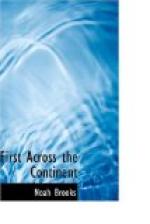On the twenty-fifth of April, the explorers believed, by the signs which they observed, that they must be near the great unknown river of which they had dimly heard as rising in the rocky passes of the Great Divide and emptying into the Missouri. Captain Lewis accordingly left the party, with four men, and struck off across the country in search of the stream. Under the next day’s date the journal reports the return of Captain Lewis and says:—
“On leaving us yesterday he pursued his route along the foot of the hills, which he descended to the distance of eight miles; from these the wide plains watered by the Missouri and the Yellowstone spread themselves before the eye, occasionally varied with the wood of the banks, enlivened by the irregular windings of the two rivers, and animated by vast herds of buffalo, deer, elk, and antelope. The confluence of the two rivers was concealed by the wood, but the Yellowstone itself was only two miles distant, to the south. He therefore descended the hills and camped on the bank of the river, having killed, as he crossed the plain, four buffaloes; the deer alone are shy and retire to the woods, but the elk, antelope, and buffalo suffered him to approach them without alarm, and often followed him quietly for some distance.”
The famous water-course, first described by Lewis and Clark, was named by them the Yellow Stone River. Earlier than this, however, the French voyageurs had called the Upper Missouri the Riviere Jaune, or Yellow River; but it is certain that the stream, which rises in the Yellowstone National Park, was discovered and named by Lewis and Clark. One of the party, Private Joseph Fields, was the first white man who ever ascended the Yellowstone for any considerable distance. Sent up the river by Captains Lewis and Clark, he travelled about eight miles, and observed the currents and sand-bars. Leaving the mouth of the river, the party went on their course along the Missouri. The journal, under date of April 27, says:—
“From the point of junction a wood occupies the space between the two rivers, which at the distance of a mile come within two hundred and fifty yards of each other. There a beautiful low plain commences, widening as the rivers recede, and extends along each of them for several miles, rising about half a mile from the Missouri into a plain twelve feet higher than itself. The low plain is a few inches above high water mark, and where it joins the higher plain there is a channel of sixty or seventy yards in width, through which a part of the Missouri, when at its greatest height, passes into the Yellowstone. . . .




